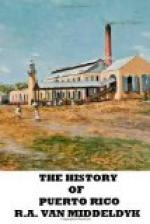The political restlessness in the Peninsula, accentuating as it did the party antagonisms in Cuba and Puerto Rico, led the governors, most of whom were chosen for their adherence to conservative principles, to endeavor, but in vain, to stem the tide of revolutionary and Separatist ideas with more and more drastic measures of repression.
This persistence of the colonial authorities in the maintenance of an obsolete system of administration, in the face of a universal recognition of the principles of liberty and self-government, added to the immediate effect on the economic and social conditions in this island of the abolition of slavery, for which it was unprepared,[58] brought it once more to the brink of ruin.
From 1873 to 1880 the resources of the island grew gradually less, the country’s capital was being consumed without profit, credit became depressed, the best business forecasts turned out illusive, the most intelligent industrial efforts remained sterile. The sun of prosperity which rose over the island in 1815 set again in gloom during this period of seven years.
The causes were clear to every unbiased mind and must have been so even to the prejudiced officials of the Government. They consisted in the anomalous restrictions on the coasting trade, the unjustifiable difference in the duties on Spanish and island produce, the high duty on flour from the United States, the export duties, the extravagant expenditure in the administration, irritating monopolies, and countless abuses, vexatious formalities, and ruinous exactions.
Mr. James McCormick, an intelligent Scotchman, for many years a resident of the island, who, in 1880, was commissioned by the Provincial Deputation to draw up a report on the causes of the agricultural depression in this island and its removal by the introduction of the system of central sugar factories, describes the situation as follows:
" ... The truth is, that the country is in a pitiable condition. Throughout its extent it resents the many drains upon its vitality. Its strength is wasted, and the activities that utilized its favorable natural conditions are paralyzed. The damages sustained have been enormous and it is scarcely possible to appraise them at their true value. With the produce of the soil diminished and the sale thereof at losing prices the value of real estate throughout the island has decreased in alarming proportions. Everybody’s resources have been wasted and spent uselessly, and many landholders, wealthy but yesterday, have been ruined if not reduced to misery. The leading merchants and proprietors, men who were identified with the progress of the country and had vast resources at their command, after a long and tenacious struggle have succumbed at last under the accumulation of misfortunes banded against them.”
Such was the situation in 1880.
To relieve the financial distress of the country a series of ordinances were enacted[59] which culminated in the reform laws of March 15, 1895, and if royal decrees had had power to cure the incurable or remove the causes that for four centuries had undermined the foundations of Spain’s colonial empire, they might, possibly, have sustained the crumbling edifice for some time longer.




